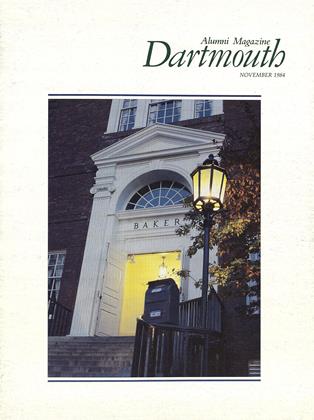A look at last year's cumulative Ivy League standings indicates Dartmouth could use a shot of something.
The men's teams finished last in the Ivies for the fifth consecutive year. Last year, however, Dartmouth struggled more than ever. For example: ice hockey 3-23-0; men's soccer 3-8-3; baseball 12-18; men's basketball 11-15; football 4-5-1; men's tennis 3-11; men's lacrosse 6-7.
"Our lack of competitive success in the Ivy League is a great concern/' says Leland. "It's not because of our egos, either. I'm disappointed for athletes and our coaches."
The men's varsity teams had a combined overall record of 88-120-4 for a .424 winning percentage in 1983-84. The College's record against the other seven Ivy schools was 40-61-1 for a .397 winning percentage. On the other end of the spectrum, Harvard put together a 150-77-8 overall record for a .655 winning percentage.
In the women's cumulative standings, Dartmouth can usually be found in the middle of the Ivy League pack. Last year, however, the College fell to seventh with a 72-71 overall record for a .503 winning percentage.
With the exception of football (two titles, in three years) and women's basketball (four titles in five yeafs), Dartmouth has had little success winning Ivy championships. The College captured only one Ivy championship last year, that coming in women's rowing.
Leland has been speaking to alumni groups across the country about the changes that are taking place in the College's varsity athletic programs. "The message that we're trying to get across is that we want all the programs to improve in the Ivy League," he says. "We're not satisfied with the status quo.
"I think our biggest challenge in Dartmouth athletics is to create that kind of confidence in themselves that most of the alumni had when they were here. I know we can recapture what Dartmouth has had in the past. I think we are just three years away from being as good as we can be."
The grumbling over Dartmouth's admissions standards can often be heard in Alumni Gym. Coaches can tell you about the high school athletes they've recruited who are not accepted at Dartmouth and end up attending Yale and Princeton.
Leland doesn't buy the argument that Dartmouth's admissions standards are preventing the College from winning move Ivy League championships. "It has been an issue, but it's not the reason we find ourselves in the situation we're in," he says. "I wouldn't agree that our [academic] standards are hurting Dartmouth athletics."
Although academics have priority, Leland doesn't think winning is being de-emphasized at the College. "Winning is important," he says. "Sure, the kids are students first, but it's a distortion to say winning isn't important because we are in the Ivy League.
"I don't think you can have fun in athletics if you're 0-11."
Leland, 35, worked at the University of Houston, at Stanford and Northwestern before arriving in Hanover IV? years ago. He says there's nothing quite like Dartmouth alumni. "I think the involvement of our alumni is unparalleled," he says. "Not only quantity, but the quality has flabbergasted me.
"I'm used to alumni coming up to me and asking why can't you beat Texas? Our alumni are concerned with more than just that. They want to win, but they want to keep athletics in an educational context." Leland has noticed another unique quality in Dartmouth alumni. "At other schools I've been to there's been tension between different alumni groups," he explains. "One group wants to make all varsity sports into recreational activities and the other group wants to be like Michigan.
"At Dartmouth, the alumni are more unified. I find our alumni are incredibly sold on the value of Ivy athletics."
Terry Fortin '87, of Amerbury, Mass., takes a penalty stroke for the Green's Ivy-leading field hockey team.
 View Full Issue
View Full Issue
More From This Issue
-
 Feature
FeatureThe Draft: To Register or Not to Register
November 1984 By James Heffernan -
 Feature
FeatureLife After the Presidency
November 1984 By Shelby Grantham -
 Feature
FeatureHamming It Up
November 1984 By Gay E. Milius, Jr. '33 and Dick Dorrance '36 -
 Feature
FeatureGet a Job
November 1984 By Nancy Wasserman '77 -
 Feature
FeaturePractice, practice, practice
November 1984 -
 Books
BooksSo Much More
November 1984 By Peter Smith
Jim Kenyon
-
 Sports
SportsCormier: Committed coach
DECEMBER 1984 By Jim Kenyon -
 Sports
SportsGymnast takes title
APRIL • 1985 By Jim Kenyon -
 Sports
SportsCamps on campus
MAY 1985 By Jim Kenyon -
 Sports
SportsThree laxwomen make All-Ivy
June • 1985 By Jim Kenyon -
 Sports
SportsThe Man Behind the Berry Sports Center
DECEMBER • 1985 By Jim Kenyon -
 Article
ArticleBack where it all began: Al McGuire at Dartmouth
MAY 1986 By Jim Kenyon







